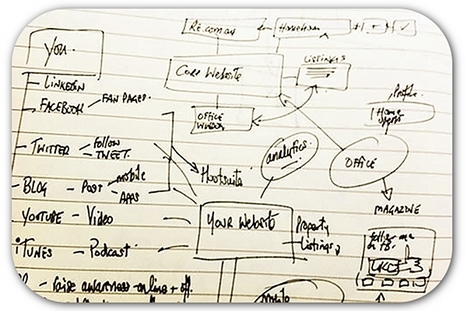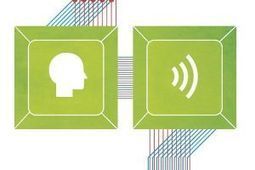 Your new post is loading...
 Your new post is loading...
Some simple advice for educators on how to maximize your time. Busy schedules are one reason why educators don't collaborate and connect through social networking platforms. But a lack of time isn't the main issue. It's priorities. And because this month is Connected Educators' month, this is a good time to share why educators need to get connected, said Derek McCoy, the new principal of Spring Lake Middle School in North Carolina.
The insertion of social media in education has the potential to advance core aims of our society: to teach students how to engage with their families, neighbors, and communities in a new way. The combination of social media and education requires that we teach students how to become literate in a digital world. The skills of literacy are no longer just about reading and writing, but about abilities that surround our responsibilities as authors.
Participatory culture is a wide notion that, according to danah boyd, encompasses such things as Web 2.0 and user-generated content: "it is broadly about the ways in which a networked society rich with media enables new forms of interaction and...
Via suifaijohnmak
Social learning is the new buzzword in the learning profession. But it's nothing new – social learning has always taken place in the office. What is new, however, is how social media tools are being used by many individuals and teams to support their own learning in powerful new ways. These new methods are changing the way L&D needs to think about learning in the organisation. REGISTER Topic: Social Media and Its Impact on How We Learn in the Workplace Date: Wednesday, August 8
Time: 2 PM Australian EST
Duration: 1 Hour Speakers:
Jane Hart, Founder, Centre for Learning & Performance Technologies
Karen Moloney, LearnX Foundation
This 60 second video trailer for http://www.rheingold.com/netsmart is my answer to contemporary critiques of the pitfalls and hidden costs of our fondness for social media. I don't challenge the critiques. I lay out, in detail, what you and I can do about them -- and empower ourselves in the process.
KF: Howard Rheingold is developing a clickable content map for use in his classes. Probably worth watching this develop.
Does your university really need a staff newsletter or a Facebook page? Tracy Playle explains why social media strategies need a clear objective to drive their purpose
Via Peter Mellow
"Small-world networks allow information to travel rapidly across large populations. A small number of random, distant connections are required. Small-world networks permeate the world. Human sociality, chemical reactions in living cells, and electric transmission grids share key properties." ~Net Smart (P. 251) KF: Howard Rheingold's book,"Net Smart" , builds on his previous works about online culture to map effective strategies for engaging in the world online. The relevance of his ideas can permeate personal, social, political, corporate, educational and academic spheres. This Facebook presence for the author and his book allows a reasonably direct access to the source.
"After a week of increasingly intermittent engagements with Twitter I stumbled back into the Twitterverse this afternoon and one of the first things I see is this post from @marksmithers. It is Mark’s response to the call for help from @courosa for his keynote at the Melbourne PLE conference next week. Alec’s question is Why do (social) networks matter in teaching & learning?"
Via EDTECH@UTRGV
The qualitative data that is freely available on social media platforms has huge potential. Drawing on his research into what Twitter can tell us about the popularity of universities, Geraint Johnes writes that Twitter and Facebook messages could be the key to valuable data.
Some ideas by Katrina Gulliver "1. Put up an avatar. It doesn't really matter what the picture is, but the "egg picture" (the default avatar for new accounts) makes you look like a spammer. 2. Don't pick a Twitter name that is difficult to spell or remember. 3. Tweet regularly. 4. Don't ignore people who tweet at you. Set Twitter to send you an e-mail notification when you get a mention or a private message. If you don't do that, then check your account frequently. 5. Engage in conversation. Don't just drop in to post your own update and disappear. Twitter is not a "broadcast-only" mechanism; it's CB radio. 6. Learn the hashtags for your subject field or topics of interest, and use them. 7. Don't just make statements. Ask questions. 8. Don't just post links to news articles. I don't need you to be my aggregator. 9. Do show your personality. Crack some jokes. 10. Have fun."
Via Steve Wheeler , Paulo Simões, Maggie Verster, @LearningWheel
Social Media in Higher Education: New social dimensions to learning A presentation from the Socal Media in Higher Education conference Sydney, June 26/27 2012. The presentation was focussed on considering the effect of social media engagement on teacher - student relations. Does Social Media affect perceptions of authority? Is anywhere, anytime support possible?
From an email sent by Common Sense Media: "Announcing the latest research report from Common Sense Media's Program for the Study of Children and Media. This research study provides a snapshot of how U.S. teens experience the role of social media in their social and emotional lives. Key findings include: -Teens are avid, daily users of social media, with Facebook being the most popular site at 68% -Teens are more likely to report a positive impact from using social media -Most teens prefer face to face communication, as "moments only happen in person" -Teens wish they could disconnect more often" KF: Some interesting insights for Higher Edcuation as these uses are only a blink away from entering our portals. Helps to reposition the general view of use and offers some stimulus to thinking about differentg ways of approaching social media use in higher ed.
Via Jim Lerman
|
HETL Note: We are pleased to present “Social Media: Why It Matters to Everyone in Education” – an opinion article by Daniel Clark. The article explores social media and the use of social media in an educational context applying a staged model proposed by the author. Daniel Clark views social media as an immediate challenge with the potential to introduce major changes to educational approaches and paradigms.
There, I said it. Social media increases student engagement. How do I know this? Well, let's try an analogy. Let's say that you are a carpenter in the early 1900s. You have a certain toolkit that you use to go about your work. You build houses with said toolkit. Now, let's hop in a DeLorean to 2012. Carpentry is a totally different gig. The tools have changed…a lot. Big box stores provide ample selections of tools and all sorts of gadgets. Carpentry has evolved, in part, because the tools have made increases in efficiencies possible. In the sense that Student Affairs practitioners are like carpenters - instead of building houses - we build community, increase student engagement, and foster opportunities for student development. The work has evolved over time and so have our tools. Social media provide a great set of channels for communications and engagement. However, here's the caveat: Social Media are only as good as we make them. The tools themselves do not build houses nor do they increase student engagement. We do. Practitioners actively create structures that enhance engagement.
By Jose Picardo "Students have discovered that learning is no longer bound to the confines of the school building and schools are beginning to realise that teaching students how to use these technologies effectively for academic purposes is essential if they want their students to engage in the use of social networking appropriately, less sporadically and more spectacularly. "The rising importance and availability of online social networks and their popularity among young people are undeniable facts. The use of the internet is becoming an ever more integral part of young people’s lives and, as a result, they are communicating with each other on an unprecedented scale.... "Online social networks provide teachers and students with a platform in which they can interact beyond the constraints of the school walls, and with which the teacher can provide personalised feedback, peer review, assessment and support beyond that which is possible with the already existing virtual learning environments, which, in my experience, quickly become repositories of institutionally approved teaching materials and effectively discourage cooperation and interaction among students, fostering instead less meaningful, transactional interaction such as the setting or handing in of student work or the communication of assessment grades."
Via Jim Lerman
Social media is a type of online media that expedites conversation as opposed to traditional media, which delivers content but doesn’t allow readers/viewers/listeners to participate in the creation or development of the content. Social media essentially is a category of online media where people are talking, participating, sharing, engaging, networking, and bookmarking online. Social Media is media for social interaction, using highly accessible and scalable communication techniques. Social media is the use of web-based and mobile technologies to turn communication into interactive dialogue.
If you want to know what’s happening in the social web you need social media monitoring tools. Before you reach for your wallet and start to spend money try out some of the free social media monitoring services.
Keynote for the PLE Conference in Melbourne, Australia, July 12, 2012. KF: Alec's image of the networked teacher has become standard fare for any discussion around socially driven education. This keynote presentation expands the notion and presents the shifts that have occured in the past few years.
Manage a Twitter feed or Facebook account, or write a blog? You’ll be able to relate to many (maybe all) of the items on this list. "Inside each frustration is a chance to be a leader, to reach out and invite people to help build something we can’t build alone. The effort, the explaining, the energy can transform a business by enlisting and celebrating customers, employees, vendors, and partners who help it thrive. The first connection occurs when we show folks how these new tools make what they do faster, easier, more efficient, and more meaningful."
KF: A collection of video tutorials helping you better utilise and better understand some of the major social media sites otday. The collection addresses Facebook, Twitter, Google+, and Pinterest witht he added bonus of Google Earth, Wordpress and Photoshop.
"The issue of how we use social media for our own development as teachers and as digitally skilled individuals, is one that I believe is of vital importance though, not just because it can enable us to keep developing as teachers through the content, ideas, resources and above all people it gives us access to, but also because the way use digital media for our own development should guide and influence the way we use it with our students and build their digital literacies and communication skills." KF: Nic Peachey is emerging as one of the leading curators on technology and learning. In this post Nic outlines how he works with social media to find, capture, process and redistribute information.
"You find a link to an article about Route 66 and aspire to plan a road trip. You watch a video about cliff diving and wonder if you have what it takes. You uncover a photo of your grandma and decide to explore your family tree. You hear about a cool event and want to invite friends to join in the festivities. So you create a Mightybell space. You invite friends to bring their ideas. You explore the possibilities together. Your curiosity grows into a passion. Repeat often to bring more color to life." KF: An extension of the current trend of curation tools that actively engages group interaction as part of the process.
|



 Your new post is loading...
Your new post is loading...







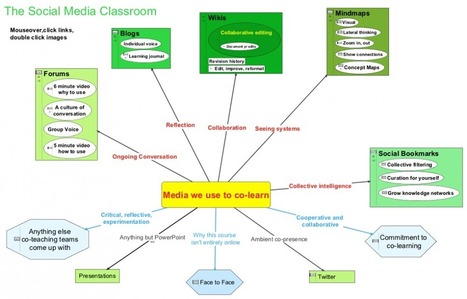







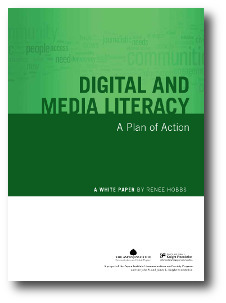

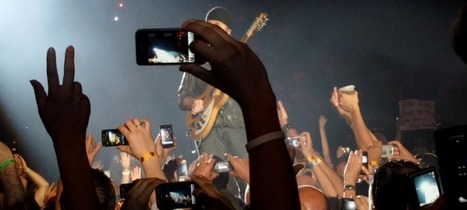

![54 Free Social Media Monitoring Tools [Update2012] | Social Media for Higher Education | Scoop.it](https://img.scoop.it/a4rCmqCCBKGvvOPCMVyHOTl72eJkfbmt4t8yenImKBVvK0kTmF0xjctABnaLJIm9)
